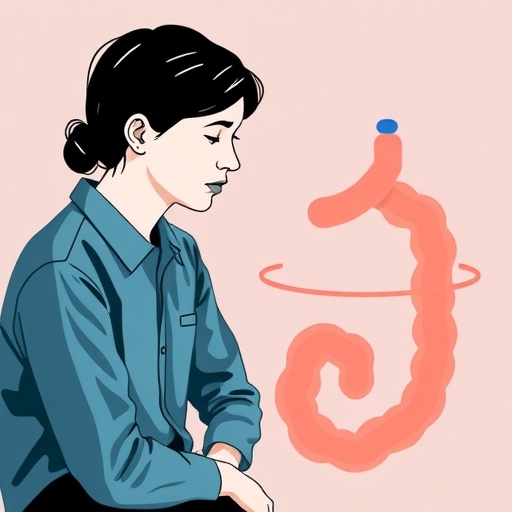In an era defined by a rising awareness of mental health’s significance, a groundbreaking investigation has shed light on the profound impact of anxiety and depression on individuals suffering from Inflammatory Bowel Disease (IBD). Published in BMC Psychiatry, this extensive research delineates the intricate connections between psychological distress and quality of life (QOL) among IBD patients, and ushers in a cautious optimism toward digital mindfulness interventions tailored for this vulnerable population.
IBD, encompassing conditions such as Ulcerative Colitis (UC) and Crohn’s Disease (CD), represents a chronic inflammatory state of the gastrointestinal tract that profoundly disrupts physical health. Yet, the toll of IBD is not confined to the physical domain; psychological comorbidities like anxiety and depression often exacerbate the disease burden, diminishing patients’ QOL significantly. Recognizing this, the study undertook a dual approach: first, to quantify the relationship between psychological symptoms and QOL via a large-scale web-based survey; second, to pilot an innovative online mindfulness program to assess its viability and preliminary efficacy in ameliorating psychological impairment.
The initial survey encompassed 484 patients diagnosed with IBD, evaluating anxiety using the Generalized Anxiety Disorder-7 (GAD-7) scale, depression via the Patient Health Questionnaire-9 (PHQ-9), and QOL through the Short Health Scale (SHS). The findings were stark—over 80% exhibited severe anxiety or depression symptoms. This alarming prevalence underscores the urgent need to address mental health as an integral component of IBD management.
Advanced regression analyses disclosed robust correlations between both anxiety and depression severity and deteriorations in QOL. Specifically, for UC patients, anxiety scores accounted for nearly 43% of the variability in SHS scores, reflected in a coefficient of 12.6, while depression explained 37% variability with a coefficient of 9.2. Crohn’s Disease patients presented slightly attenuated but statistically significant associations, with anxiety explaining 27% (coefficient 10.4) and depression 22% (coefficient 7.2) of QOL variance. These insights illuminate a dose-response relationship, indicating that worsening psychological distress directly undermines life quality in IBD.
Building upon these correlational findings, the study introduced the Online MINdfulness-based stress reduction with Daily EXercise (MINDEX) intervention. This digitally delivered program was designed to be accessible, combining mindfulness techniques with physical activity guidance over a two-month period. Participants were randomized either to the MINDEX or an active control receiving IBD education videos. The primary metrics included changes in anxiety, depression, QOL, and sleep quality as measured by the Pittsburgh Sleep Quality Index (PSQI).
Despite promising theoretical foundations of mindfulness in mitigating stress, the pilot’s results revealed no statistically significant differences between the mindfulness and control groups after two months. Both cohorts exhibited minimal shifts in anxiety, depression, QOL, and sleep quality scores. Completion rates further highlighted the challenge of digital interventions, with retention modestly favoring the mindfulness group yet overall engagement rates remaining low. These findings suggest that implementing effective online mental health programs for IBD is feasible but requires optimization to enhance adherence and therapeutic impact.
The apparent disconnect between the significant cross-sectional associations and the pilot intervention’s limited influence may reflect multiple factors. Short intervention duration, small sample size, and the complex biopsychosocial dynamics of IBD-related distress could confound responsiveness to mindfulness practices. Moreover, the variability in individual patient engagement with digital platforms may necessitate personalized adjustments to increase efficacy.
Crucially, the study advocates for more comprehensive, longitudinal investigations to unravel causality between psychological symptoms and QOL in IBD, as well as to rigorously evaluate digital mindfulness approaches. Given the chronicity of IBD and fluctuating symptomology, extended follow-ups might capture delayed or cumulative benefits undetectable in brief pilots. Furthermore, integrating biomarkers and objective disease activity indices could elucidate interactions between inflammation, mental health, and life quality.
The research also spotlights the emergent role of telemedicine and e-health tools in managing chronic diseases, especially in contexts where access barriers or stigma might limit traditional mental health care. Carefully tailored digital mindfulness programs hold potential as adjunct therapies, yet robust validation and contextual customization remain prerequisites for widespread adoption.
As the medical community grapples with optimizing holistic care for IBD patients, these findings reinforce the imperative to prioritize psychological well-being. Anxiety and depression are not mere comorbid afterthoughts—they are central determinants of life quality and possibly disease outcomes. By elucidating their impact and trialing innovative interventions, this study charts a promising yet challenging pathway forward.
In conclusion, the intersection of mental health and chronic gastrointestinal inflammation emerges as a frontier of urgent clinical and scientific inquiry. While digital mindfulness interventions exemplify an attractive modern strategy, this pioneering research tempers expectations, emphasizing the need for larger-scale trials with prolonged follow-up and refined engagement strategies to unlock their full potential. Patients living with IBD deserve integrative, evidence-based care that addresses both body and mind—and this work marks an essential step toward that goal.
Subject of Research: Impact of anxiety and depression on quality of life in Inflammatory Bowel Disease patients and preliminary evaluation of an online mindfulness intervention.
Article Title: Impact of anxiety, depression and online mindfulness on IBD patients’ quality of life: a web-based cross-sectional survey and randomized pilot study
Article References:
Hu, S., Xu, D., Zhu, C. et al. Impact of anxiety, depression and online mindfulness on IBD patients’ quality of life: a web-based cross-sectional survey and randomized pilot study. BMC Psychiatry 25, 1063 (2025). https://doi.org/10.1186/s12888-025-07426-7
Image Credits: AI Generated
DOI: 06 November 2025




